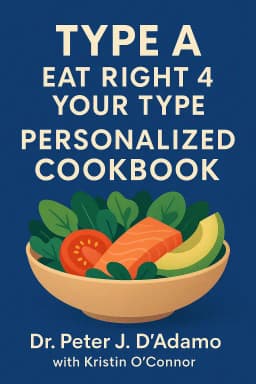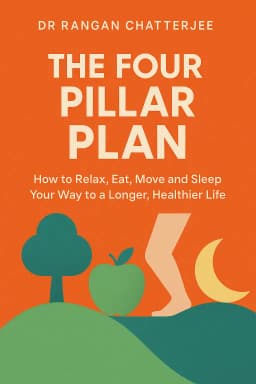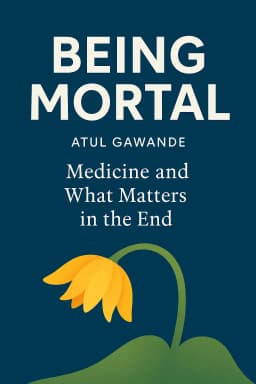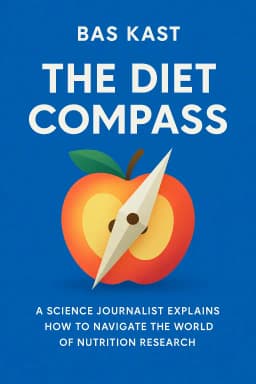
The Great Diet Deception
Golden Hook & Introduction
SECTION
Laura: Here's a wild thought: What if the diet you started to get healthy is actually making you 150% more likely to get sick? That’s not a typo. We’re talking about a number that turns the entire fitness industry on its head. Sophia: Whoa, hold on. One hundred and fifty percent? That sounds completely backward. Are you saying that trying to lose weight and then gaining it back is worse than never having dieted at all? Where is that coming from? Laura: It comes from the research underpinning today's book, 'The 12-Week Fitness Project' by Rujuta Diwekar. And what's fascinating is that Diwekar has been fighting this battle for decades. She started her career in the late 90s, a time when traditional Indian foods like ghee were being demonized by Western trends. She built her reputation, and became a go-to for Bollywood stars, by telling people to ignore the fads and trust their grandmother's wisdom. Sophia: I can see the appeal. The constant whiplash of diet advice is exhausting. One minute coffee is a superfood, the next it's poison. It feels like we're all just guessing. Laura: Exactly. And Diwekar's entire philosophy is about cutting through that noise. That 150% statistic is the perfect entry point into her first, and maybe most important, argument: our obsession with the weighing scale is fundamentally misguided and, in many cases, dangerous.
The Great Diet Deception: Why 'Health' Isn't About Weight Loss
SECTION
Sophia: Okay, let's unpack that, because it goes against everything we're taught. We see 'before and after' photos everywhere. The number on the scale is the ultimate measure of success, right? Laura: That's the myth the book systematically dismantles. Diwekar points to a growing body of research on what’s called the 'Metabolically Healthy Obese' population. These are individuals who are classified as obese by BMI standards, but their internal health markers—like blood pressure, cholesterol, and insulin sensitivity—are perfectly normal. Up to 30% of the obese population falls into this category. Sophia: Huh. So you can be 'overweight' but perfectly healthy on the inside. Laura: Precisely. And the reverse is also true. The real danger isn't a stable, higher weight; it's the constant fluctuation, the yo-yo dieting. That's where the 150% increased risk for diseases like diabetes and heart disease comes from. The body gets stressed and inflamed by these cycles of starvation and re-feeding. Sophia: That makes so much sense. It’s the classic New Year's resolution story from the book. You start with incredible enthusiasm, you're at the gym every day, you're eating nothing but kale. And then, as the book says, 'life takes over.' Laura: It always does. And the book has this brilliant line: "Life, as they say, takes over. But that is only if you think of health and fitness as separate from living your life." The problem is that we treat health like a project with a deadline, not an integrated part of our existence. Sophia: It’s like we’re trying to hold our breath for six weeks, hoping to be magically transformed on the other side. But you can't hold your breath forever. Laura: What a perfect analogy. And the book gives a powerful historical example of this. In the early 1990s, after the fall of the Soviet Union, Cuba was hit with a severe economic crisis. Food and fuel were scarce. The government called it the 'Special Period.' Sophia: I can imagine that wasn't a great time for anyone. Laura: Not at all. People were forced to walk or cycle everywhere, and their daily calorie intake dropped significantly. And what happened? The population lost a lot of weight, and rates of diabetes and heart disease plummeted. On paper, it looked like a public health miracle. Sophia: Okay, but I'm sensing a 'but' coming. Laura: A huge one. As soon as the Cuban economy started to recover in the mid-90s, what do you think happened? Sophia: People went back to their old habits, and the weight came back on. Laura: It came back with a vengeance. Obesity rates tripled, and the rates of those lifestyle diseases shot right back up. The key insight is that weight loss achieved through deprivation and crisis is neither desirable nor sustainable. Health has to be built on a foundation of abundance and joy, not scarcity and stress. Sophia: So the 'how' you lose weight is infinitely more important than the 'how much.' It’s about the means, not just the end. Laura: Exactly. As one of the author's clients hilariously described her experience with a keto diet, she was 'low on confidence and high on farts.' That’s not a recipe for long-term well-being.
The Ancestral Wisdom Blueprint: Eating Local, Seasonal, and Traditional
SECTION
Sophia: Okay, I’m sold. The scale is the wrong target, and crash diets are the wrong tool. So what is the right way? Where do we even begin if we're throwing out the modern rulebook? Laura: We begin by looking backward. The entire foundation of Diwekar's project is to eat local, seasonal, and traditional foods. In her words, "Eat the way you grew up eating." Sophia: That sounds so simple it's almost revolutionary. Laura: It is! And the public was starving for this message. When she first launched the 12-week project online as a free initiative, she was hoping for maybe 5,000 sign-ups. She got 75,000 overnight. The system crashed. Sophia: Wow. That’s incredible. Laura: And it leads to one of my favorite stories in the book. She closed registrations, feeling overwhelmed. Then she gets this anonymous call from a man in Hyderabad. He basically tells her off. He says, in Hindi, "Scalability se darte hain," which means "You're afraid of scalability. You underuse technology." He challenged her to reopen it, to handle the massive demand. Sophia: I love that. A random stranger basically peer-pressured her into creating one of the world's largest public health projects. Laura: And she did! It ended up with over 125,000 people from more than 40 countries. It proves there's a deep, collective yearning to return to a more common-sense approach to food. People are tired of being confused. Sophia: I can definitely relate. One day, we're told fat is the enemy. The next, everyone is putting butter in their coffee. It’s impossible to keep up. Laura: And Diwekar’s answer is to ignore all of it. Take ghee, for example. For years, this clarified butter, a staple in Indian cooking, was demonized. It was blamed for heart disease. Diwekar was one of the first mainstream voices to push back, arguing it's a healthy fat that aids digestion and is rich in vitamins. She has this wonderful quote: "satya aur ghee ki hamesha jeet hoti hai" – truth and ghee always win. Sophia: It’s like she’s giving people permission to enjoy their own cultural foods again, without guilt. Laura: That's the emotional core of it. She's not just prescribing a diet; she's restoring cultural pride and trust in ancestral wisdom. Her point is that these food systems have sustained populations for centuries. They are inherently balanced and adapted to their local climate and genetics. Why would we trade that for a fad diet invented last year in California? Sophia: That’s a powerful question. And it connects to a bigger idea in the book, that nutrition science is evolving to see food as more than just carbs, protein, and fat. Laura: Yes! It’s about its impact on the local economy, on the soil, on the global ecology. Choosing to eat a local, seasonal vegetable supports a local farmer and is better for the planet than eating an out-of-season fruit that’s been flown halfway across the world. Health becomes an interconnected web, not just a personal obsession.
Fitness is Uncomplicated: Small, Cumulative Habits
SECTION
Sophia: This all sounds wonderfully simple in theory. Eat like your grandmother did. But how do you actually do it? Life is complicated. People are busy. Laura: That's the final piece of the puzzle, and it’s the most practical part of the book. The project isn't a single, drastic overhaul. It's 12 simple guidelines, introduced one per week. And you follow them cumulatively. So in week two, you're doing the guideline from week one plus the new one for week two. Sophia: So it’s a slow, gradual build. That feels much less intimidating. Laura: It's designed to be. It allows habits to form slowly and sustainably. And the guidelines themselves are incredibly simple. The book is filled with testimonials from participants, and they are genuinely life-changing. Sophia: Give me an example. What's a guideline that sounds too simple to work, but does? Laura: Okay, Guideline #1: Start your day with a banana or another fresh fruit, or some soaked almonds or raisins. Do this before your morning tea or coffee. Sophia: That's it? Eat a banana? Laura: That's it. And here’s a story from the appendix. A woman named Aparna wrote that she had debilitating sweet cravings after every single meal. She felt so low on energy in the afternoons she was considering seeing a doctor. She started following just this one guideline—a banana every morning. Within a short time, her sweet cravings completely vanished. Her energy levels stabilized for the entire day. Sophia: Honestly, that sounds like a miracle. A banana fixed her sugar cravings? Laura: It’s not magic; it’s biology. Starting the day with the right kind of natural sugar and fiber helps regulate your blood sugar from the get-go, preventing the crashes that lead to cravings later. Here's another one. A woman named Subhasri was diagnosed with adenomyosis, a painful uterine condition. She started following the guidelines, including one about eating soaked almonds and raisins with a pinch of saffron. She reported a massive reduction in her pain and bloating. Sophia: Wow. These aren't just stories about losing a few inches. These are profound health turnarounds from what seem like tiny, almost insignificant changes. Laura: That is the entire point. The power is in the consistency of small, positive actions. And crucially, the book fosters a mindset of self-compassion. If you have a bad week and can't follow the guidelines, you don't beat yourself up. You just start again the next week. There's no "falling off the wagon" because the wagon is always there, waiting for you to hop back on. Sophia: That removes the guilt, which is often the thing that derails people for good. You eat one piece of cake, feel like a failure, and then eat the whole cake. Laura: Exactly. Diwekar has another fantastic quote about this, from a story about a client who felt guilty after indulging. She told her, "Food nahin, guilt is fattening." Guilt is more fattening than food. The stress hormone cortisol released by guilt and shame is what really messes with your metabolism.
Synthesis & Takeaways
SECTION
Sophia: So the real journey isn't about a 12-week transformation, but using 12 weeks to build a foundation for… well, forever. It's about learning a new language of health. Laura: Exactly. The book's ultimate argument is that health isn't a war you wage against your body with calorie calculators and restrictive rules. It's about making peace with food, trusting ancient wisdom, and understanding that small, joyful acts of self-care, done consistently, are the most powerful medicine we have. Sophia: It’s a shift from seeing your body as a problem to be fixed to seeing it as an intelligent system to be nourished. Laura: Perfectly put. It’s about getting out of your own way and letting millennia of food wisdom do the heavy lifting. The book is a guide back to a truth our bodies already know, but our modern minds have forgotten. Sophia: It makes you wonder, what's one simple, traditional food or habit from your own childhood that you've abandoned for a 'healthier' modern alternative? Laura: That's a great question. Maybe it's full-fat yogurt, or white rice, or just the simple act of sitting down to eat without a screen. Sophia: I think that’s a perfect question for our listeners. We'd love to hear your answers. Come find us on our socials and share what comes to mind. What's your 'ghee' or your 'morning banana'? Laura: This is Aibrary, signing off.









